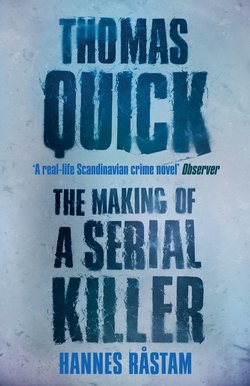Читать книгу Thomas Quick - Hannes Råstam - Страница 24
На сайте Литреса книга снята с продажи.
ОглавлениеTHE HERMIT
AFTER THE CARE assistants had left us alone in the visiting room, Sture Bergwall got out some coffee cups and a Thermos. I produced a few tired-looking cheap pastries from Willy’s in Säter. For a while we indulged in small talk about my drive from Gothenburg, how spring was on its way and other trivialities.
We spoke about how he had been inside these walls since Ingvar Carlsson had become prime minister and Mikhail Gorbachov had been at the helm of the Soviet Union! Sture had arrived at Säter before the first web page on the Internet had been created.
‘I’ve never had a conversation on a mobile phone,’ said Sture, who had understood from watching television that nowadays everyone walked around with a telephone pressed to their ear.
‘How do you survive such a long period of isolation?’ I asked. ‘What do you do with all this time?’
His answer flowed like water, as if he had been waiting a long time to give it.
‘My day starts at exactly 05.29. Usually I just wake up, or else there’s the alarm clock. Then I listen to Ekot [News] on the radio and get up at 05.33. After the morning procedures I walk to the canteen at 05.54 to get coffee and buttermilk. I’m so punctual that the assistants say they can set their watches by me!’
He took a bite of his pastry and washed it down with a mouthful of coffee.
‘At exactly 06.05 I ring the bell to be let outside. On the dot! That’s the only way to survive in here,’ he explained. ‘I have to be incredibly routine-ey. Incredibly routine-ey!’
I nodded, understanding very well what he meant.
‘Today is the two thousand, three hundred and sixty-seventh day in a row that I’ve taken a walk round the exercise yard. I do it every day.’
Sture looked at me as if expecting a reaction.
‘Two thousand, three hundred and sixty-seven days,’ I repeated, impressed.
‘My walk in the exercise yard is for exactly one hour and twenty minutes, in the pattern of a figure of eight. At 07.25 I take a shower and then I have a coffee and read the newspapers. Then I start my work of solving crossword puzzles. I subscribe to a number of difficult crossword magazines. I’ve never left a crossword unsolved. Sometimes it can take days to solve the last few clues, but I always solve them. Often I send them in – I use the name of someone who works here so I don’t attract any attention – and I’ve won small prizes quite a few times, a lottery ticket or something. It’s like a job. The crosswords keep me busy from eight thirty to four in the afternoon. In the daytime I always keep the radio on. Always P1! The programmes I like are Tendens [‘Tendency’], Släktband [‘Family Ties’], Lunchekot [‘Midday News’], Vetandets värld [‘The World of Knowledge’] and Språket [‘Our Language’]. At six in the evening I retire to my room and after that I don’t want to be disturbed by anyone. Then the evening routines begin, and they are mainly about watching television. I go to bed at nine thirty. At ten o’clock I turn out the lights and go to sleep.’
It was exactly as I had suspected. Sture Bergwall had no contact with anyone outside the hospital. No one at all. Hardly even with his fellow patients.
‘Sture, you’ve confessed to a large number of murders. And you’ve been convicted for eight of them. Do you still stand by your confessions?’
Sture looked at me in silence, before answering.
‘The confessions stand firm. They do . . .’
There was a lull in the conversation while we let this decisive prerequisite for our meeting sink in. I looked at the mysterious man sitting before me.
Either he was the worst serial killer in northern Europe, or he was a mythomaniac who had duped the entire Swedish judicial system.
Nothing about the man gave me the slightest clue as to which alternative seemed most likely.
‘You’re living under rigorous security conditions,’ I said, trying to move things along. Sture listened attentively. ‘The clinic seems more or less escape-proof: steel doors, reinforced glass, alarms.’
He mumbled his agreement.
‘I’m wondering . . . What would happen if you were allowed to rejoin society?’
Now Sture was looking at me with incomprehension.
‘Would you fall back into criminality, start murdering and cutting up children again?’
His heavy gaze grew even sadder.
‘No, no, no!’
Slowly he shook his head, then stopped and sat there with his eyes looking down at his lap.
‘No, I wouldn’t.’
I didn’t give up.
‘So what would happen if you were allowed to live in society under supervision?’
‘The doctors believe that I need to be kept in psychiatric care—’
‘I know that,’ I interrupted. ‘I’ve read what they have to say about it. But now I’m asking you. You strike me as fairly normal. Reasonable.’
‘Yes?’ his voice rose in that characteristic way of his. He smiled and looked as if I had said something absurd. ‘Wasn’t I supposed to be?’ he added rhetorically.
‘No you weren’t! You’re regarded as Sweden’s most dangerous and craziest basket case. Haven’t you understood that?’
Sture didn’t seem to have taken offence, but the question remained unanswered: what would happen if Sture Bergwall were released?
The question was justified.
The man in front of me appeared to be sensitive and kind. It was difficult to merge one’s impression of him with that of the cruel, sadistic serial killer.
And what conclusions might I infer from that?
None at all, I thought.
The silence was broken by the care assistants from Ward 36 coming to take the serial killer back to his cell.
We said our farewells without agreeing to meet again.
